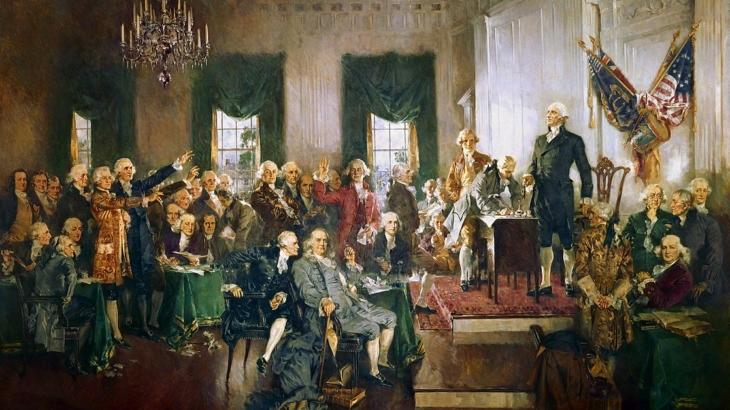Principle of Governing to Secure Liberty of the People, Not Government
 Essay Read by Constituting America Founder, Actress Janine Turner
Essay Read by Constituting America Founder, Actress Janine Turner
Our Founding Fathers did not create a government or craft a constitution to serve government’s interests or even their own narrow interests. They created a government that focused on securing the liberty of the American people and that strictly limited and checked the power of the federal government. They had a great deal of experience with government that existed for the primary purpose of advancing the interests of those who already had tremendous political power.
They had experienced the tyranny of the British Crown. In the Broadway play “Hamilton,” King George sings, “And when push comes to shove, I will send a fully armed battalion to remind you of my love” and “when push comes to shove, I will kill your friends and family to remind you of my love.” While those exact words were not likely uttered by King George, that was what he did in practice. It also reveals the way so many rulers treated their subjects throughout history.
Our Founders specifically rejected this model of abusive and unlimited government. Virtually every government in recorded history either started out, or became first and foremost about increasing and preserving its own power, influence and prestige at the expense of its subjects. Rarely has government been focused on the citizen’s freedom and opportunity. That may be the rhetoric used to obtain or retain power, but it has rarely been the actual focus of government.
Every dictator in history has made promises of using the power that he sought for the benefit of the people. But virtually none of them have actually done it. It has always been a talking point, but not an action point. Whether it was Mao or Lenin, Hitler or Mussolini, Castro or Chavez, or the Ayatollah, they all promised to create a more equal and just society, and to right past wrongs. But, of course, history records that they magnified and multiplied the wrongs and made society far worse. They created societies of increased brutality, misery, and poverty.
In contrast, America’s Founders wrote a constitution that limited the power of government — even though they knew that they would likely be the early presidents, cabinet secretaries, congressmen and senators. In other words, they wrote a constitution that limited their own power. That proves they were not cut from the same cloth as most of the rulers we read about in history books. They formed a government designed to limit and check governmental power, but keep the people as free as possible from government’s arbitrary edicts and mandates.
Some argue that one of the weaknesses of our Constitution is that it is difficult and sometimes cumbersome to get things done. But that wasn’t by accident. It was by design. Our Founders understood that government’s power to do evil and to compromise and abridge the natural rights of its citizens was far more significant than the likelihood that government power, if left unchecked, would be used to benefit the citizenry or preserve their freedoms.
So our Founders wisely placed limits on their own power. They did this because they wanted to create a society where the freedoms and the opportunities available to the citizenry were virtually unlimited. They did not see themselves as rulers and American citizens as their subjects. They saw themselves as having been temporarily entrusted with limited powers to govern, not rule; and they saw Americans as citizens, not subjects.
George Washington, the president of the constitutional convention where our Constitution was written, debated and passed, and our nation’s first president, refused to be called by the titles that many of the kings and powerful were called in Europe. He said “No” to being called His Highness, His Excellency, His Mightiness, His Elective Majesty, among others. He said his title should be “Mr. President.”
At that time, those of power and wealth had titles — Lord, Duke, His Grace, etc. In contrast, a person of common station, with no real societal power, was referred to simply as Mister. And that is the title that George Washington chose to emphasize that the government they were forming wasn’t there to benefit those who held office, but to guarantee freedom and opportunity to its people.
But it wasn’t merely George Washington who rejected the historical political power model of Europe. The Founders as a group wanted to build a society whose foundation included the principles of self-government, but that also didn’t subject our basic rights to the popular vote. Simply stated, the Bill of Rights makes it clear that even if the vast majority of Americans don’t like what you’re saying or writing, you have the right to say it or write it.
Even if the majority dislikes you, you have the right to due process and a fair trial if you’re accused of a crime. Even if the government wants your property and claims to need it for the public good, it may not take it from you without paying you for its value. The Bill of Rights, properly understood, is not a statement of rights as much as it is a firm prohibition against government and the majority trying to abridge our God-given rights. So our Founders crafted a government designed to empower the people through majoritarian processes, but also protected our rights — placing them beyond the power of a popular vote or the power of government to abridge.
If we think about the type of constitution that most people throughout history who have aspired to power would write, we would see few limits on their power and a great deal of limits on the people and their rights. But our Founders were very different and that made a huge difference in the sort of nation the United States of America became.
It was John Adams, our nation’s second president and a crucial Founder, who said in a letter, “We ought to consider, what is the end of government, before we determine which is the best form.” [1] And the Founders did precisely that. They thought about what they wanted America to become — a land of freedom and opportunity for its citizens — and carefully crafted a constitution to accomplish that goal. This is proof positive that our Founders were very different from most of history’s politically powerful figures.
Our Founders understood the fundamental importance of limiting the power of government and leaving the people free to govern the details of their own lives. As James Madison said in the Federalist Papers, Number 51,
“If Men were angels, no government would be necessary. If angels were to govern men, neither external nor internal controls on government would be necessary. In framing a government which is to be administered by men over men, the great difficulty lies in this: you must first enable the government to control the governed; and the next place, oblige it to control itself.”
Throughout history, governments had whatever powers they could get away with exercising — including genocide and murder of the masses. But our Founders designed a government that would be the foundation for a civil society of order and peace, but anywhere beyond that, government was forced to limit itself and its actions.
This has made all the difference and launched America to greatness. This approach made Americans the freest, most prosperous people in the world. People clamor to come to America from all over the globe because they see it as a shining city on a hill and as a land of opportunity. When the power of the government is constitutionally limited, the freedoms and opportunities of the people are maximized and the people thrive rather than merely survive.
Our Founders got it right — they didn’t build a government to benefit themselves or make government all-powerful. They carefully crafted a constitution that made Americans free, protected their rights, and made opportunity a key feature of the nation. That makes our Founders unique in history and we owe them a debt of gratitude.
 George Landrith is the President of Frontiers of Freedom. Frontiers of Freedom, founded in 1995 by U.S. Senator Malcolm Wallop, is an educational foundation whose mission is to promote the principles of individual freedom, peace through strength, limited government, free enterprise, free markets, and traditional American values as found in the Constitution and the Declaration of Independence.
George Landrith is the President of Frontiers of Freedom. Frontiers of Freedom, founded in 1995 by U.S. Senator Malcolm Wallop, is an educational foundation whose mission is to promote the principles of individual freedom, peace through strength, limited government, free enterprise, free markets, and traditional American values as found in the Constitution and the Declaration of Independence.
[1] John Adams, Thoughts on Government, in a letter in reply to William Hooper 1742-1790, North Carolina Continental Congress Delegate and John Penn 1740-1788, North Carolina Continental Congress Delegate, April 1776. https://teachingamericanhistory.org/document/thoughts-on-government-2/
Further reading:
Papers of John Adams, volume 4, III Thoughts on Government, Massachusetts Historical Society
https://www.masshist.org/publications/adams-papers/index.php/view/ADMS-06-04-02-0026-0004
The Works of John Adams, vol. 4. Part of The Works of John Adams, 10 vols. A 10 volume collection of Adams’ most important writings, letters, and state papers, edited by his grandson. Vol. 4 contains Novanglus, Thoughts on Government, and Defence of the Constitution. https://oll.libertyfund.org/title/adams-the-works-of-john-adams-vol-4
Click here for First Principles of the American Founding 90-Day Study Schedule.
Click here to receive our Daily 90-Day Study Essay emailed directly to your inbox.




Join the discussion! Post your comments below.
Your feedback and insights are welcome.Feel free to contribute!